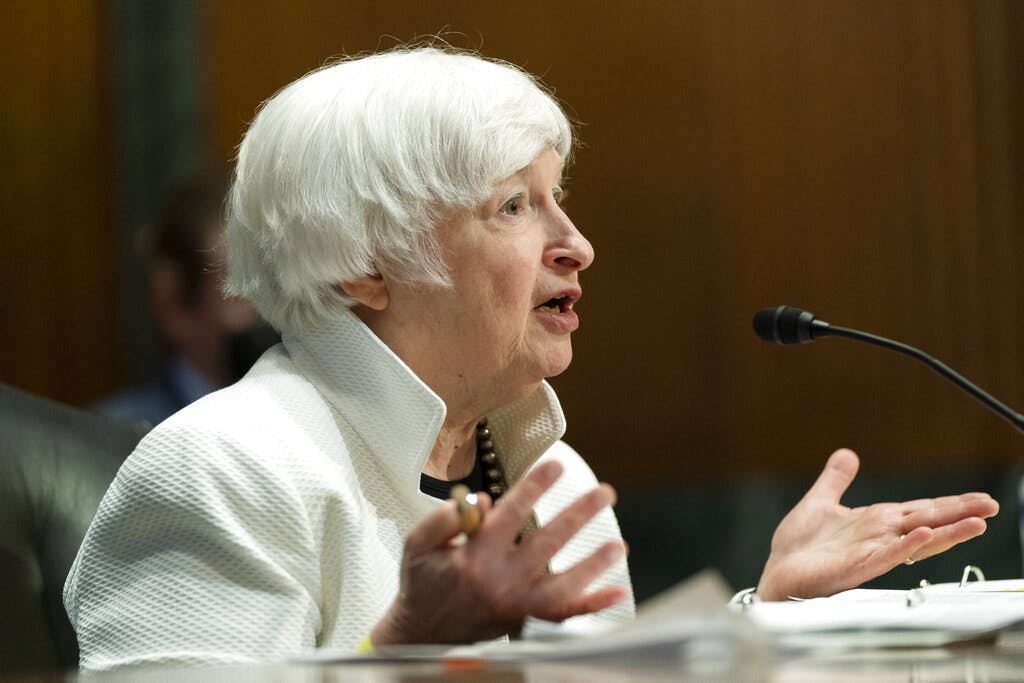White House Officials Attempt To Spin Their Way Out of a Recession
Ahead of what is expected to be a week of bad economic news, the Biden administration is going to great lengths to remind Americans that technically the country is not in a recession.

What exactly is a recession, and who gets to decide?
The traditional definition, a rule of thumb relied on by economists for decades, has been that America is in recession if it posts two straight quarters of negative growth in the gross domestic product.
Yet, as the White House has gone to great lengths to remind Americans in the last couple of days ahead of what is expected to be a week of bad economic news, that’s not technically the definition of a recession.
Technically, the White House wants everyone to keep in mind this week, it’s not a recession until the National Bureau of Economic Research says it is. So far, the eight economists on the bureau’s Business Cycle Dating Committee have yet to weigh in on whether the country is in a recession.
So, regardless of what the data tell us this week about the sorry state of the economy, America is not technically in a recession, according to the White House.
That’s even if consumer confidence, due Tuesday, shows that consumers are especially pessimistic at the moment, or the Federal Reserve continues, as expected, to increase interest rates on Wednesday to curb rampant inflation.
Even if the Commerce Department reports Thursday that GDP growth declined, as expected, by 1.6 percent in the second quarter and consumer prices show continued increases on Friday, the country is not technically in a recession, by the White House’s reckoning.
The maneuvering began late last week with a blog post on the administration’s website under the headline, “How Do Economists Determine Whether the Economy Is in a Recession?” The post’s anonymous author wasted no time stating the salient talking point preferred by the Biden administration.
“While some maintain that two consecutive quarters of falling real GDP constitute a recession, that is neither the official definition nor the way economists evaluate the state of the business cycle,” the post stated.
“We know that the U.S., along with the rest of the global economy, faces significant headwinds,” the post continued. “At the same [time], there is a good chance that the strength of the labor market and of consumer balance sheets [will] help the economy transition from the rapid growth of the last year to steadier and more stable growth.”
The treasury secretary, appearing Sunday on NBC’s “Meet the Press,” was the first to run with the theme. Janet Yellen admitted that the economy is slowing down, but trotted out a number of more positive indicators — a strong jobs market, solid consumer spending, growing industrial output — to make a case that America is not really in a recession.
“A recession is a broad-based contraction that affects many sectors of the economy. We just don’t have that,” Ms. Yellen said. “This is not an economy that’s in recession. … But we’re in a period of transition in which growth is slowing.”
She conceded that the “common definition” of recession is two negative quarters of GDP growth — “or at least that’s something that’s been true in past recessions,” she interjected — but she reiterated that the White House has different criteria for determining whether the country is in a recession.
“There’s an organization called the National Bureau of Economic Research that looks at a broad range of data in deciding whether or not there is a recession,” Ms. Yellen said. “And most of the data that they look at right now continues to be strong. I would be amazed if the NBER would declare this period to be a recession, even if it happens to have two quarters of negative growth.”
Ms. Yellen stressed that “we’re in a period of transition in which growth is slowing, and that’s necessary and appropriate,” a refrain that would be repeated by the director of President Biden’s National Economic Council, Briane Deese, in an appearance on CNN Monday morning.
“We are seeing a slowing,” Mr. Deese said. “That is not only expected, but necessary, as we operate through this transition.”
Like Ms. Yellen, Mr. Deese went out of his way to avoid the R-word.
“The technical definition of a recession considers a much broader spectrum of data points,” Mr. Deese insisted. “We have real global challenges here in the short term and we’ve got to navigate our way through them, but we have to do so without giving up all our economic gains. That’s going to be our focus, and I think we need to train that focus on that rather than on sort of technical debates on backward-looking data.”
Despite the exhaustive spin, the administration’s critics were having none of it Monday morning. Appearing on CNBC, the former head of President Trump’s Council of Economic Advisers, Kevin Hassett, said the administration should be owning up to the obvious instead of trying to deny it.
“If I were in the White House, I would not be out there denying it’s a recession,” Mr. Hassett said. “I think that one of the reasons why they’re in denial is they don’t have a plan to fix it. And so they’re just in denial. So they were in denial about inflation. Now they’re in denial about the recession.”

